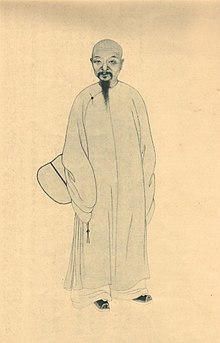
Pan Lei (Chinese: 潘耒; pinyin: Pān Lěi) (1646 – 1708) was a Qing dynasty scholar. He wrote the prefaces for a number of works that appeared in his time. In the preface to writer Qu Dajun's book “Guangdong Xinyu,” which is widely regarded as a valuable source on the economic and social conditions of Guangdong in 1700, Pan wrote about the beauty, natural resources, and unique history of East Guangdong. Pan was also involved in the study of mathematics. In the preface to Mei Wending's Fangchenglun, a treatise on linear algebra written in 1690, he wrote:
Although mathematics is the last of the Six Arts (liui ), it has wide applications. Without mathematics, it is impossible to understand the measurement of Heaven and the survey of the Earth; it is impossible to regulate taxes and to manage finances; it is impossible to raise armies and dispose troops; it is impossible to administer civil engineering.
Pan Lei's collected works also included the opinions of women who believed that poetry writing was considered unnecessary for women, which led to their works being kept secret.
References
- Chen, Yong (1997). "The Internal Origins of Chinese Emigration to California Reconsidered". The Western Historical Quarterly. 28 (4). The Western Historical Quarterly, Vol. 28, No. 4: 520–546. doi:10.2307/969884. JSTOR 969884.
- Jun Yong Hoon (2006). "Mathematics in Context: A Case in Early Nineteenth-Century Korea". Science in Context. 19 (4): 475–512. doi:10.1017/S0269889706001049. S2CID 145680643.
- Wing-Chung Ho, Clara (1995). "The Cultivation of Female Talent: Views on Women's Education in China during the Early and High Qing Periods". Journal of the Economic and Social History of the Orient. 38 (2): 191–223. doi:10.1163/1568520952600588. JSTOR 3632515.
This article about a poet from China is a stub. You can help Misplaced Pages by expanding it. |